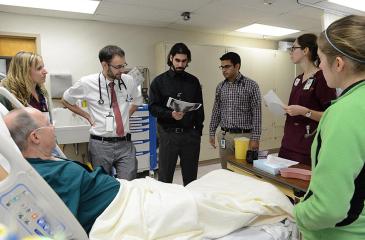Given the natural collaborations occurring between health professionals in practice, the experiential environment offers an ideal opportunity for students to observe and develop in their interprofessional competencies in order to tackle real-world healthcare problems.
The Center for Interprofessional Health leadership team recently published a study on interprofessional students’ insights into the experiential learning environment, exploring what students value most, how experiential learning can be improved, and what ways students see interprofessional collaboration in practice impacting learners, provider teams, communities, and health systems.
Here’s what they found:
- Students perceived the greatest value of interprofessionality in the clinical learning environment as growing their own skills and actively engaging with other professionals and learners.
- Students value interactions with and observations of practicing health professionals, reinforcing just how essential role modeling is in preparing our future healthcare workforce. Moreover, rather than just merely observing, having a meaningful task or role in team-based activities is instrumental.
- Intentional and innovative efforts must be made by academic programs, interprofessional education programs, experiential placement sites, and health professions accreditors to make the impacts on care systems, cost of care, communities, and populations more explicit in the experiential learning environment.
There remain opportunities to learn from our students and shape IPE opportunities to meet their interests and also prepare them as a collaborative practice-ready workforce serving Minnesota and beyond. Please let us know what interprofessional insights you’d like to share.
Driving Innovation & Discovery

Many of the most pressing agricultural challenges are global in scope and impact. Resolving such challenges requires partnership and collaboration across borders and disciplinary boundaries. With support from OACA, Laura L. Rice, PhD, is leading a study to enhance food security education. This project trains teachers to tackle global challenges and promote inclusive education. They surveyed Minnesota agricultural teachers to understand current practices and will present the findings and engage teachers in a hands-on professional development workshop.

CTSI Awarded Funding for Clinical Research 360 Project
The Clinical and Translational Science Institute (CTSI) was recently awarded funding from the 2023 Research Infrastructure Investment Program. Funded by the Office of the Vice President for Research, the program awards matched funding to projects that support transdisciplinary research and collaboration across the U of M’s colleges and campuses. The awards are designed to facilitate interdisciplinary partnerships and strengthen the University’s research infrastructure. The Clinical Research 360 initiative, led by CTSI, addresses gaps in integrated operational data availability for senior leaders, PIs, departments, and centers.
Advancing Interprofessional Education & Training
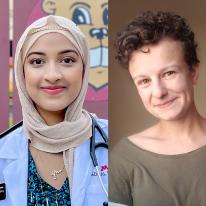
OACA Interprofessional Internship Highlight: Morris Challenge Project
Saliha Chaudhry, from the Medical School, and Kevan O’Hanion, BA, from the School of Public Health, worked on the Morris Challenge Project, which aims to promote sustainability, practical solutions, and community cooperation to improve health and quality of life. Throughout the project, Chaudhry and O’Hanion worked to assess the needs related to healthcare sustainability in rural areas of Minnesota. Through interviews with community health leaders, advocates, educators, and professionals, they found that there was a strong desire to bridge the gap between the rural health workforce and high school students. As a result, they developed an intervention to facilitate connections, information sharing, and mentorship between health professionals and high school students, with a particular focus on potential first-generation students and underrepresented minority students.
Partnering with Communities
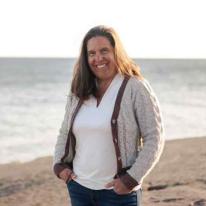
Bridging the Gap: Project REACH’s Influence on Early Intervention Services in Rural Minnesota
In 2022, three rural Minnesota community leaders were chosen as the second cohort for Project REACH, a year-long health policy and leadership training program by the University. Jodi Tervo Roberts, an early childhood advocate, focused on equitable access to early intervention services for children with special health needs in rural areas. Through REACH, she built connections and learned to navigate complex policies. The program empowered her to be a more effective advocate, bringing positive change to her community.
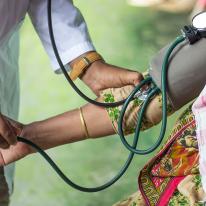
Transforming Healthcare Delivery: Drew Adamek’s Journey with MHI
Drew Adamek, a recent graduate of the U of M’s College of Biological Science, found the Mobile Health Initiative (MHI) to be greatly impactful and essential to the vision he has of his future in medicine. Excited by the opportunity to improve health access and address disparities in his communities, Adamek embraced MHI’s no-cost healthcare approach, and hopes to continue the lessons he learned at MHI to implement innovative strategies of healthcare delivery.
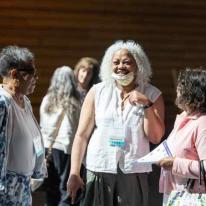
Empowering Connections: The CPWML Conference Builds a Supportive Community
Joining hearts and minds, the Caring for People with Memory Loss (CPWML) Conference, envisioned by Joseph Gaugler, PhD, provides families and caregivers with an opportunity to engage in discussions on key issues people are grappling with on a daily basis. With up-to-date research, breakthroughs, and community-driven topics, the annual conference offers vital insights and tools for managing caregiving responsibility. As dementia impacts millions of people, the event fosters a strong sense of community and support to those whose lives have been affected by memory loss.
U-Wide Events and Opportunities

The second installment of the Distinguished Scholars webinar series on Aug. 4 will explore and challenge ways of practicing and implementing interprofessional education. Get your "what if" questions about IPE answered and learn about local, actionable goals the panelists are implementing in their community that focus on meaningful measures of teamwork.
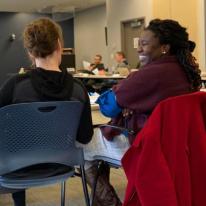
K12 Scholars Career Development Program
The program supports early-stage investigators to be competitive for National Institutes of Health independent Career Development (K) or Research Project (R01) awards. The three-year program offers 75% salary support, $30,000 in research funding, and mentorship from a multidisciplinary team. LOIs due Aug. 1.
